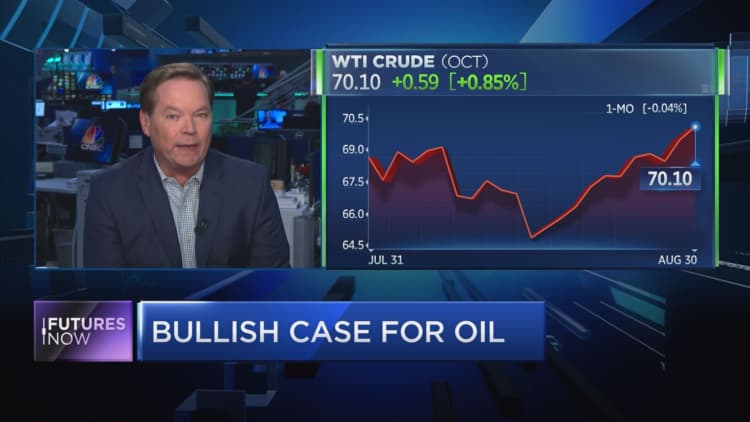Oil prices slipped on Friday but remained near $70 a barrel as impending U.S. sanctions on Iran and falling Venezuelan output offset concerns over the impact of a global trade war.
Benchmark Brent crude oil was down 35 cents a barrel at $77.42 by 2:18 p.m. ET. U.S. light crude ended Friday's session down 45 cents lower at $69.80.
Despite Friday's losses, both Brent and U.S. light crude jumped about 2 percent this week after strong gains in the last two sessions. U.S. light crude gained 1.5 percent in August, while Brent was on track for a rise of 4.3 percent.
Some analysts say the uptrend in crude prices will continue.
"Brent prices will exceed $80 per barrel before the end of the year," U.S. bank Jefferies forecast on Friday.

Oil markets are tightening with a recent surplus draining, trade figures show. The volume of unsold crude stored in the Atlantic basin has dwindled from around 30 cargoes to just a handful in recent weeks, a Reuters analysis showed.
"The contracts are in a strong up-trend," said Robin Bieber, who watches price charts for brokerage PVM Oil Associates.
Investors are worried that, with Venezuelan supply falling sharply, Iranian crude supply will be cut sharply ahead of the imposition on U.S. sanctions on Tehran in November.
"The November deadline to comply with the U.S. demands for an Iran oil embargo is moving closer, and in anticipation, buyers seemingly have begun reducing their purchases," said Norbert Ruecker, commodity analyst at Swiss bank Julius Baer.
"Venezuela remains equally concerning," he added.
U.S. President Donald Trump threatened in an interview with Bloomberg News on Thursday to withdraw from the World Trade Organization, his latest salvo in a deepening dispute between the United States and its major trading partners.
Economists are worried that rising trade barriers between the world's major economies will drag on global growth and, by extension, erode energy demand.

"You have to wonder if it (crude) can sustain these prices in a world where President Trump doubles down on his battle with the EU and China at the same time," said Greg McKenna, chief market strategist at futures brokerage AxiTrader.
Trump is prepared to ramp up a dispute with China and has told aides he is ready to impose tariffs on $200 billion more Chinese imports as early as next week, Bloomberg reported on Thursday.
Oil analysts cut their price forecasts for 2018 for the first time in almost a year in August, as concerns about the impact of the global trade war deepen, a Reuters poll shows.
A Reuters survey of 45 economists and analysts forecast Brent would average $72.71 in 2018, 16 cents below the $72.87 projected in July and above the $71.96 average so far this year. The price was forecast to average $72.58 in 2019.
— CNBC's Tom DiChristopher contributed to this report.

